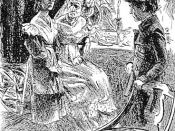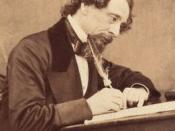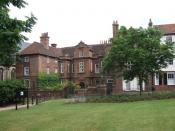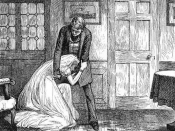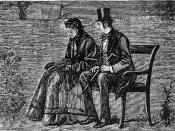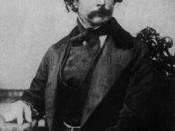Charles Dickens's, Great Expectations, is a satirical and dramatic novel that exposes the main character to wealth and the upper class. Set in London in the mid-nineteenth century, the novel focuses on a poor boy and his development through adversity to aristocracy. Set amidst the class system of Victorian England, Dickens's story delivers a message concerning a person rising above a difficult situation, while focusing on self-improvement and the extent to which someone will go for sovereignty.
Throughout Great Expectations, Charles Dickens describes the class system of Victorian England. There are the poor who live in desolate parts of England like Joe and there are very rich people like Miss Havisham. A middle class also exists in which Pumblechook falls into. A main part of the social class theme is Pip realizing that being rich and high in status is not as important as being loving and nice. Towards the middle of the book, Pip is nasty towards Joe and Biddy because he believes that he is higher up in status than them, a good example of this is when in Chapter 14 Pip declares that, "It is a most miserable thing to feel ashamed of home."
An interesting thing about the class system of England at the time is that everybody who was wealthy worked to get their wealth rather than hereditary aristocracy. An example of this is Miss Havisham who made her fortune from the brewery that is attached to her house. A perfect description of the Victorian class system is located in Chapter 27 when Joe said goodbye to Pip, "Pip, dear old chap, life is made of ever so many partings welded together, as I may say, and one man's a blacksmith, and one's a whitesmith, and one's a goldsmith, and one's a coppersmith. Diwisions among such must come, and must be met as they come."In the beginning of the novel, Pip was a young boy who lived in his sister's house. Both of Pip's parents died and he only looked up to Joe, the blacksmith. Proof of this is in the first part of the book when Pip is describing Joe, "Home was never a pleasant place for me, because of my sister's temper. But Joe had sanctified it." After visiting the Satis House, Pip demonstrates his idealistic side. He desperately wanted to rise above his difficult situation at home. When Pip receives his fortune he is ecstatic, and he believes that his fondest dreams have been realized. In Chapter 19, Pip thinks Biddy is jealous of his fortune, "'You are dissatisfied on account of my rise in fortune, and you can't help showing it.'" Pip later realizes that being a blacksmith is often more moral and rewarding than being prodigiously rich.
A major theme of Great Expectations is the ambition for self-improvement. Whenever Pip is not able to do something he instantly wants to learn how to do it. An example of this is when Pip could not read, he went to Mr. Wopsle's aunt's school. Pip is very hard on himself when he acts nefariously to Joe and Biddy. Pip intensely wants to improve his moral self because he feels very guilty when he says selfish things. Pip acts very idealistic in the novel because he only sees himself getting richer and getting nicer things and not thinking about reality. It is very hard for Pip to come to terms with his own narrow viewpoint and accept that there are more important things in life than improvements. Finally Pip learned that improvements are not a sign of one's real worth and that honesty and morality are to be valued above how you look and how people think of you.
The book ends with Pip returning back to his childhood home with the thought of marrying Biddy. After recovering from his illness, Pip finds the Satis House ready for an auction. Soon after arriving Pip searches for both Joe and Biddy but for a long while, has no luck. When Pip finally finds Joe and Biddy they declare that they are married. Pip is both shocked and surprised but acts happy. Eleven years after Pip learned that Joe and Biddy married, he came back to his home and tried convincing Biddy that he has become a bachelor. Pip then goes to the Satis House and finds it in ruins. Pip finds Estella walking through the garden as they discuss the past. Pip and Estella leave the building, Pip thinks they will always stay together.
The message of Great Expectations applies to the world at large. For example, the class system of Victorian England is almost the same as that of modern day America. The theme of rising above a difficult situation mirrors the positions of today's rag-to-riches millionaires. The desire for self-improvement is a predicament that many people, like Pip have suffered from. Therefore the themes of Great Expectations not only entertain the reader and make them think deeply but influence the world at large.
Sources in MLA formatCooper, Michael "Great Expectations - Charles Dickens - English Literature Essay." Great Expectations - Charles Dickens - English Literature Essay. 20 Oct. 2005. EzineArticles.com. 14 Jun 2009 .
Dickens, Charles, and Calder, Angus. Great expectations / Charles Dickens ; edited by Angus Calder Penguin, Harmondsworth, Middlesex : 1965
